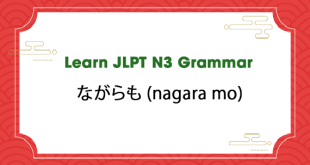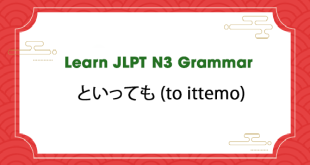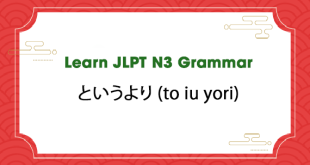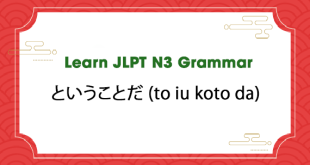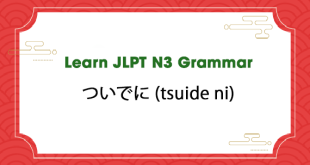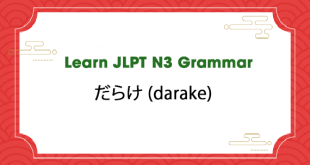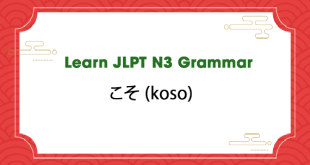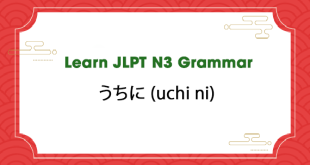Learn JLPT N3 Grammar: において (ni oite) Meaning: in; on; at How to use: Noun + において Example sentences: 1. 当時の状況において戦争反対を訴えるのは限るなく勇気のいることだった。 tōji no jōkyō ni oite sensō hantai o uttaeru no wa kagiru naku yūki no iru kotodatta. In the situation at that time, protesting the war was an act …
Read More »Grammar N3
Learn JLPT N3 Grammar: ながらも (nagara mo)
Learn JLPT N3 Grammar: ながらも (nagara mo) Meaning: but; although; despite ~ Explain: Expression of the opposite, contrary to common thinking, contrary to imagination. The subject of the former and the latter is the same. How to use: Verb ます (stem form) + ながら(も) Verb-てform + いながら(も) Noun + ながら(も) …
Read More »Learn JLPT N3 Grammar: といっても (to ittemo)
Learn JLPT N3 Grammar: といっても (to ittemo) Meaning: although I say; although one might say; although called How to use: Noun + (だ)といっても Verb-casual + といっても いadj + といっても なadj + (だ)といっても Example sentences: 1. 雪が降ったといっても、ほんの少しで、すぐ消えてしまいました。 Yuki ga futta to itte mo, hon’nosukoshi de, sugu kiete shimaimashita. Says it’s snowing, …
Read More »Learn JLPT N3 Grammar: というより (to iu yori)
Learn JLPT N3 Grammar: というより (to iu yori) Meaning: rather than How to use: Verb-casual + というより(は) Noun + というより(は) いadj + というより(は) なadj + というより(は) Phrase + というより + Phrase Example sentences: 1. この絵本は、子供向けというより、むしろ、大人のために書かれたような作品だ。 kono ehon wa, kodomo-muke to iu yori, mushiro, otona no tame ni kaka reta yōna …
Read More »Learn JLPT N3 Grammar: ということだ (to iu koto da)
Learn JLPT N3 Grammar: ということだ (to iu koto da) Meaning: I heard; it means that; rumor has it that… How to use: Verb-dictionary form + ということだ Phrase + ということだ Noun + ということだ Example sentences: 1. 山田さんは近く会社をやめて留学刷るということだ。 Yamada-san wa chikaku kaisha o yamete ryūgaku suru to iu kotoda. I heard that …
Read More »Learn JLPT N3 Grammar: ついでに (tsuide ni)
Learn JLPT N3 Grammar: ついでに (tsuide ni) Meaning: while; incidentally; taking the opportunity How to use: Verb-casual + ついでに するVerb (without する) + ついでに Noun + のついでに Sentence 1 + ついでに + sentence 2 Example sentences: 1. 図書館へ本を借りに行った。ついでに、近くに住んでいる友達のところへ行ってみた。 toshokan e hon o kari ni itta. Tsuideni, chikaku ni sunde iru …
Read More »Learn JLPT N3 Grammar: だらけ (darake)
Learn JLPT N3 Grammar: だらけ (darake) Meaning: full of; covered with; a lot of (something undesirable) How to use: Noun + だらけ Example sentences: 1. 間違いだらけの答案が返ってきた。 machigaidarake no tōan ga kaettekita. I got my homework back full of mistakes 2. 彼は借金だらけだ。 kare wa shakkin-darakeda. He’s in debt 3. 子供は泥だらけの足で部屋に上がってきた。 kodomo …
Read More »Learn JLPT N3 Grammar: こそ (koso)
Learn JLPT N3 Grammar: こそ (koso) Meaning: for sure (emphasize preceding word); precisely Explain: こそ is a particle that emphasizes a word or phrase. How to use: Noun + こそ Example sentences: 1. 今年こそ「源氏物語」を終わりまで読むぞ。 kotoshikoso `Genjimonogatari’ o owari made yomu zo. This year is the time to finish reading “The …
Read More »Learn JLPT N3 Grammar: がち (gachi)
Learn JLPT N3 Grammar: がち (gachi) Meaning: tend to; often Explain: Used to express meaning tends, often happens…and the presentation often tends not to be good. How to use: Noun + がち Verb ます (stem form) + がち Example sentences: 1. その作家は、ここ数年病気がちでなかなかまとまった仕事ができないと言っている。 sono sakka wa, koko sū-nen byōki-gachide nakanaka matomatta …
Read More »Learn JLPT N3 Grammar: うちに (uchi ni)
Learn JLPT N3 Grammar: うちに (uchi ni) Meaning: while; during; before How to use: Verb-dictionary form + うちに Verb-ないform + うちに Verb-てform + いるうちに いadjective + うちに なadjective + なうちに Noun + のうちに Example sentences: 1. 可能なうちに人生をできる限り楽しむことが大切だ。 kanou na uchi ni jinsei o dekiru kagiri tanoshimu koto ga taisetsu da. …
Read More » Learn Japanese Learn Japanese
Learn Japanese Learn Japanese

